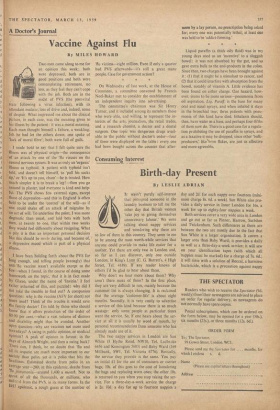A Doctor's Journal
Vaccine Against Flu
By MILES HOWARD Two men came along to me for an opinion this week: both ( were depressed, both are in good positions and both were contemplating retirement, no i less, as they feel they can't cope with the job. Both are in the midst of PVS (the post-viral state following a virus infection), with its attendant malaise, loss of drive and, indeed, sense of despair. What impressed me about the clinical Picture, in each case, was the meaning given to his illness by the patient : it was a moral meaning. Each man thought himself a failure, a weakling; felt he had let the others down; one spoke of 'lack of moral fibre'; both were full of guilt.
I made bold to say that I felt quite sure the illness was of physical origin—the consequence of an attack by one of the 'flu viruses on the central nervous system. It was as truly an 'organic' illness as typhoid. A patient with typhoid isn't told, and doesn't tell himself, to 'pull his socks up,' or 'It's up to you, chum'—he is treated. How much simpler it is to break a leg !—then you go around in plaster, and everyone is kind and help- ful. The PVS shows few external signs, except those of depression—and this in England is often held to be under the 'control' of the will—as if one could shake off an attack of migraine by an act of will. To underline the point, I was more dogmatic than usual, and laid bets with both men, at twenty to one, that within two weeks they would feel differently about resigning. What a pity it is that an important personal decision like this should be made during, and because of, a depressive mood which is part of a physical illness.
I have been holding forth about the PVS for long enough, and telling people (wrongly) that anti-'flu vaccine wasn't available except to the few—when I found, in the course of doing some homework on the topic, that it is in fact made by Glaxo, under the name of 'Invirin.' I feel rather ashamed of this, and puzzled: why did I not take the trouble to find out? A companion question : why is the vaccine (AFV for short) not more used? Think of the trouble it would save the family doctor! I'm told by those who should know that it offers protection of the order of 80-90 per cent.—what a vast volume of distress , and disability might thus be avoided. Another Open question—why are vaccines not more used nowadays? A swing in public opinion, or medical opinion? A peak of opinion in favour, in the clays of Almroth Wright, and then a swing back? There can, I think, be no doubt that 'flu and all its sequoie are much more important to our seiejetY than polio, yet it is polio that hits the headlines. Estimated deaths from polio in an average year-200; in this epidemic, deaths from 'flu ,pneum,onia—around 1,400 a month. Not to speak of all the thousands, or millions, who sutlQr .d from the PVS, in its many forms. In the 1957 epidemic, a rough guess at the number of 'flu victims—eight million. Even if only a quarter had PVS afterwards—it's still a great many people. Case for government action?
On Wednesday of last week, at the House of Commons, a committee convened by Francis Noel-Baker met to consider the establishment of an independent inquiry into advertising.
The committee's chairman was Sir Henry Turner, and it included among its members those who were able, and willing, to represent the in- terests of the arts, journalism, the retail trades, and a research chemist, a doctor and a dental surgeon. One topic was dangerous drugs avail- able to the public without doctor's order—four of these were displayed on the table : every one had been bought across the counter that after- noon by a lay person, no prescription being asked for; every one was potentially lethal; at least one was held to be 'addict-forming.'
Liquid paraffin (a thick oily fluid) was in my young days used as an incentive' to a sluggish bowel: it was not absorbed by the gut, and so gave extra bulk to the end-products in the colon. Since then, two charges have been brought against it: (1) that it might be a stimulant to cancer, and (2) that it could interfere with absorption from the bowel, notably of vitamin A. Little evidence has been found on either charge. One hazard, how- ever, seems to be more serious—pneumonia from oil aspiration. Lig. Para/,Y. is the base for many oral and nasal sprays, and when inhaled it stays in the bronchial tree; three patients with pneu- monia of this kind have died. Inhalants should, then, have water as a base, and perhaps four-fifths of them now do. There is a good case for a regula- tion prohibiting the use of paraffin in sprays, and as a laxative it may be dropped, since other 'bulk- producers,' likelbran flakes, are just as effective and more agreeable.


















































 Previous page
Previous page